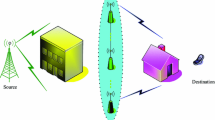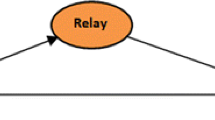Abstract
We consider multicast transmission from a single source to multiple destinations. We assume that the source cannot reach the destinations directly, but must forward its traffic through a set of assisting relay nodes. The performance objective under consideration is to maximize the common amount of information (number of bits) that the source delivers to all destinations per joule of the total energy spent. Our aim is to obtain a policy that identifies: (a) which subset of the relays should be activated, (b) for how long, and (c) the respective destinations that each relay has to serve. We consider centralized policies with exact knowledge of the channel conditions. In the special case of networks employing at most two relays, we show that for any fixed assignment of destinations to relays the problem of maximizing the number of bits per joule by choosing the duration that each relay should be activated can be formulated as a convex optimization problem. Unfortunately, the problem of assigning destinations to relays is combinatorially complex. Thus, in the sequel we present a method with reduced complexity that exploits the knowledge of the underlying channel conditions to perform this assignment. Finally, we provide a set of numerical results to illustrate the optimal relay selection and assignment of destinations to relays corresponding to different channel conditions.
Similar content being viewed by others
References
Davidson, T. N., Gohary, R. H., & Luo, Z. Q. (2003). An efficient design method for vector broadcast systems with common information. In Proceedings of IEEE global communications conference (GLOBECOM), December (2003).
Jindal, N., & Goldsmith, A. (2003). Optimal power allocation for parallel gaussian broadcast channels with independent and common information. In Proceedings of IEEE international symposium on information theory (ISIT), December (2003).
Wieselthier, J. E., Nguyen, G. D., & Ephremides, A. (2000). On the construction of energy-efficient broadcast and multicast trees in wireless networks. In Proceedings of IEEE infocom, March (2000).
Meshkati F., Poor H.V., Schwartz S.C., Mandayam N.B. (2005) An energy-efficient approach to power control and receiver design in wireless data networks. IEEE Transactions on Communications 53(11): 1885–1894
Miao, G., Himayat, N., Li, Y. G., & Bormann, D. (2008). Energy-efficient design in wireless OFDMA. In Proceedings of IEEE international conference on communications (ICC), May (2008).
Rodoplu V., Meng T.H. (2007) Bits-per-joule capacity of energy-limited wireless networks. IEEE Transactions on Wireless Communications 6(3): 857–865
Meshkati F., Goldsmith A.J., Poor H.V., Schwartz S.C. (2007) A game-theoretic approach to energy-efficient modulation in cdma networks with delay QoS constraints. IEEE Journal on Selected Areas in Communications 26(6): 1069–1078
Jain, A., Kulkarni, S. R., & Verdú, S. (2009) Minimum energy per bit for gaussian broadcast channels with common message and cooperative receivers. In: Proceedings of the 47th annual allerton conference on communication, control, and computing, September (2009).
Jing Y., Jafarkhani H. (2007) Using orthogonal and quasi-orthogonal designs in wireless relay networks. IEEE Transactions on Information Theory 53(11): 4106–4118
Laneman J. N., Wornell G. W. (2003) Distributed space-time-coded protocols for exploiting cooperative diversity in wireless networks. IEEE Transactions on Information Theory 49(10): 2415–2425
Xue, Q., Abreu, G., & Aazhang, B. (2009). Mutual information of amplify-and-forward DSTBCs over the random set relay channel. In Proceedings of IEEE information theory workshop (ITW), June (2009).
Bletsas A., Shin H., Win M.Z. (2007) Cooperative communications with outage-optimal opportunistic relaying. IEEE Transactions on Wireless Communications 6(9): 3450–3460
Shah, V., Mehta, N. B., & Yim, R. (2009). Relay selection and data transmission throughput tradeoff in cooperative systems. In Proceedings of IEEE global communications conference (GLOBECOM), 230–235.
Madan R., Mehta N.B., Molisch A.F., Zhang J. (2008) Energy-efficient cooperative relaying over fading channels with simple relay selection. IEEE Transactions on Wireless Communications 7(8): 3013–3025
Zhao Y., Adve R., Lim T.J. (2006) Symbol error rate of selection amplify-and-forward relay systems. IEEE Communication Letters 10(11): 757–759
Boyd S., Vandenberghe L. (2004) Convex optimization. Cambridge University Press, New York
Goldsmith A. (2005) Wireless communications. Cambridge University Press, New York
Author information
Authors and Affiliations
Corresponding author
Rights and permissions
About this article
Cite this article
Xue, Q., Pantelidou, A., Latva-aho, M. et al. Optimal Relay Selection for Energy-Efficient Multicast. Wireless Pers Commun 59, 433–446 (2011). https://doi.org/10.1007/s11277-011-0238-2
Published:
Issue Date:
DOI: https://doi.org/10.1007/s11277-011-0238-2




